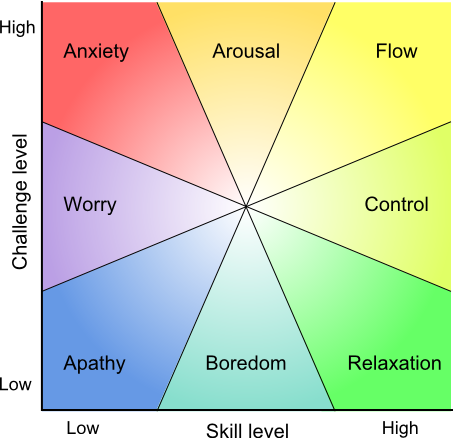Have you ever become completely lost in your favorite activity? Lost track of time? Felt focused, energized, and completely unselfconscious? As if your body and mind were working in perfect harmony?
If so, you may have experienced something by described by the Hungarian professor Mihaly Csikszentmihalyi as the Flow state. In his book Flow: The Psychology of Optimum Experience, CM explains what Flow is, when people experience it, and why it’s so important.
Athletes call this ‘being in the zone.’ Buddhists might call this simply mindfulness or low-level nirvana. The Greeks would describe this as being taken over by the muse.
Whenever you see an amazing performance or creation, it’s a safe bet to assume the performer or creator was experiencing flow.
I can't count how many times I've lost track of times while playing games, or painting, or reading or exercising, or ... well, you get the idea.
Everything I’ve read suggests that most people find flow while doing one of two things: hobbies they love or working at their job. The latter is a little surprising, as a lot of people will tell you they don’t like their job. Jobs, though, have all several of the components required for flow: a rule-based system, feedback, clear and definable goals.
A person is most likely to find flow while engaged in an activity where the challenges match the skill level. During low-challenge activities, people become bored. If an activity is too challenging, they experience worry and anxiety. The chart below describes when people are most likely to experience flow.
And finally, the tie-in with games:
Video games seem to be designed with flow in mind. People have written papers on such things. Jenove Chen, for example. Why are games so likely to help people find flow? They have all the attributes required for finding flow: a system with clear rules, immediate feedback (scores), goal-based challenges. They also require full concentration, engagement, and a certain amount of skill.
At some level, I think flow is what I'm trying to achieve out of all games.



3 comments:
I'll have to go away and think about this a bit more and probably write something for my blog later. The subject is interesting, but a mite too close to what I do for a living, and I hate bringing work home with. Actually, hate is too strong a word. I leave work stuff at work.
Flow is an easy goal to aim for but difficult to achieve. Designing with it in mind will quickly lead you into the realm of dynamic difficulty adjustment.
Jenova Chen's thesis and its corresponding game is a popular example of an approach to dealing with this.
http://www.jenovachen.com/flowingames/thesis.htm
On the flip side, saying that a good game supports flow is a little similar to saying a good painting is one people like to look at. The idea implicit with Chen's thesis and similar is that longer play time is a value positive quality. An easy concern to dismiss on its face. As an ideal quality it becomes quickly problematic as it works much better at supporting commercial value than cultural or artistic merit. Think of arcade games, WoW, and the nonsensical leader boards that xBox live required Jonathan Blow to put in "Braid".
Of couse. If your games aren't "fun", who's going to play them anyway?...
My first thought was about flow when I am playing, and how flow can occur in simple games when you play with a well matched opponent.
Post a Comment